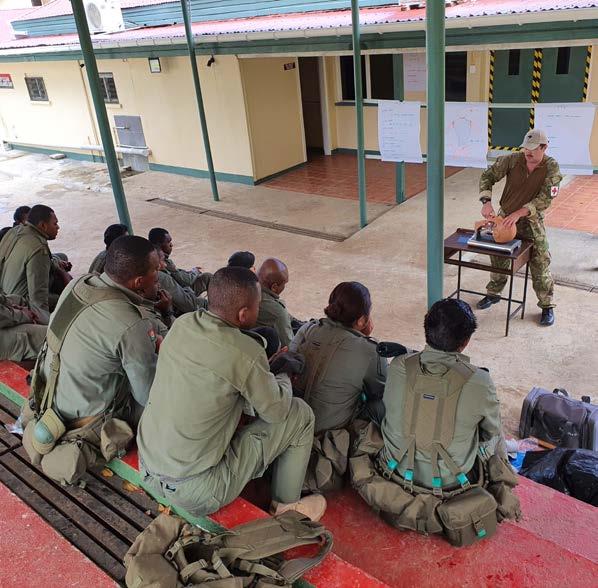
2 minute read
Helping our Fijian whānau
SHARPENING SKILLS IN FIJI
A combined training team from the New Zealand Defence Force has been working alongside its Fijian counterparts in areas ranging from basic hydrography to advanced combat first aid as part of a new training initiative in the Pacific Island nation.
Advertisement
The deployment is the first time such a large group has travelled to Fiji to train, coach, mentor and embed alongside military counterparts.
Defence Advisor to Fiji Lieutenant Colonel Josh Wineera said the Covid-19 environment had required a rethink of engagement with military partners, particularly in the Pacific.
“The NZDF has well established health protocols and we have reassured the Fijian Ministry of Health that our deploying personnel will abide by regulations to ensure the safety of the Fijian public,” LTCOL Wineera said. “This combined training team represents the first face-to-face contact between our nations this year and clearly demonstrates the trust between our two militaries in partnering for essential training.
“Working with our counterparts and growing capability is something we really enjoy doing. We’re very pleased to have been welcomed by the Government of Fiji and Republic
NZ Army instructors SSGT
Dave Foothead and WO2 Leigh
Robinson, both from the New
Zealand Collective Training
Centre, went to Fiji with the aim of adding value to current RFMF practices, working alongside the RFMF Force Training Group to deliver the training, and to foster comradeship between our militaries.
The training was at RFMF
Vatuwaqa shooting range, Suva.
It was planned and executed by SGT Sitiveni Tikomelaya of
RFMF Force Training Group, assisted by SGT Waisake
Tabualevu of the 3rd Fijian
Infantry Regiment. Force
Training Group was assisted by five other NCOs drawn from across the RFMF. of Fiji Military Forces (RFMF) to assist in this way,” he said.
Team members completed 14 days in managed isolation in Fiji before starting work.
The 15-person team included those skilled in hydrography, advanced combat first aid, an armourer for weapons maintenance, as well as those who teach instructional techniques, and trained shooting coaches.
“In the team, we also have a senior policy analyst from the Ministry of Defence who will share her expertise in policy development with the Fijian Ministry of Defence and National Security. Another team member will assist with policy and doctrine development for the RFMF,” says the team leader LTCOL John Barclay.
A NZDF psychologist was also in the team: “She provided valuable support to developing selection and recruitment criteria when recruiting intakes for the RFMF,”
The NZDF team used a variety of training methods and scenarios in Fiji.

said LTCOL Barclay. The course was broken into two phases: the first phase focussed on small arms shooting coaching theory and practical using the K2 and AKM assault rifles, the Glock 19 pistol and the RPK light machine gun. Also included were close combat shooting fundamentals.
The course was followed by a one week confirmation phase where the students delivered weapons training to 20 of their comrades from the Fijian Navy. This allowed the students to immediately put into practice all that they had learned.












